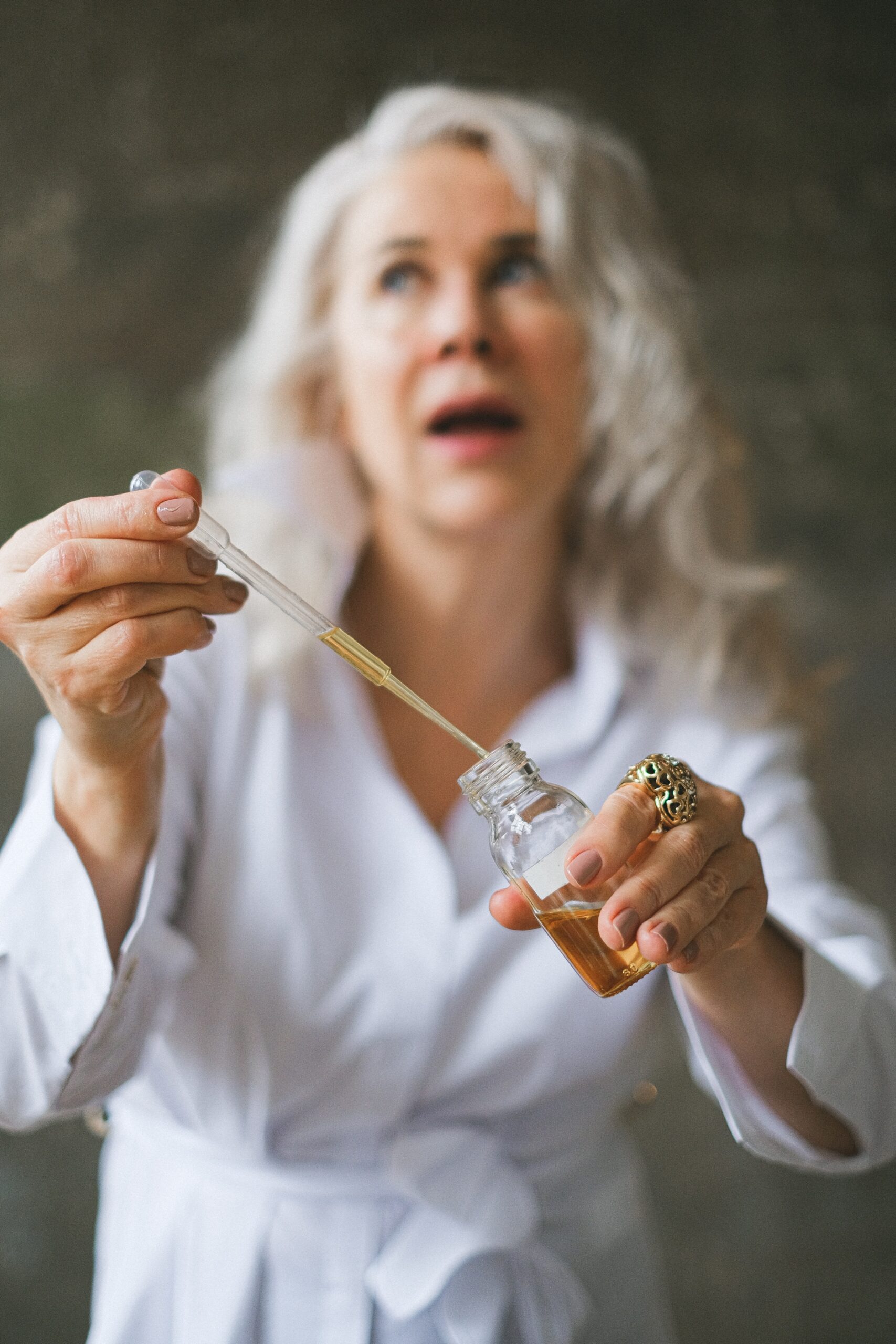

woman removing seaweed serum from a flask
When it comes to skincare, there are a multitude of ingredients and products available that claim to provide amazing results. However, sometimes the best ingredients are the ones that come straight from nature. Botanicals are plant-based ingredients that can work wonders on your skin, providing hydration, nourishment, and even anti-aging benefits. But with so many botanicals out there, how do you choose the right products for your skin type? In this blog post, we’ll explore some of the most popular botanicals and how to choose the right ones for your skin type.
If you have dry skin, you’ll want to look for botanicals that are rich in fatty acids and have hydrating properties. One great option is argan oil, which is derived from the nuts of the argan tree. Argan oil is high in vitamin E and antioxidants, which can help to moisturize and protect the skin. Another good choice for dry skin is shea butter, which is derived from the nuts of the shea tree. Shea butter is rich in fatty acids and has anti-inflammatory properties, making it an excellent choice for soothing dry, irritated skin.
If you have oily skin, you’ll want to look for botanicals that have astringent and anti-inflammatory properties. Witch hazel is a great choice for oily skin, as it can help to reduce excess oil and minimize the appearance of pores. Tea tree oil is another good option, as it has antibacterial properties that can help to prevent breakouts. Green tea extract is also beneficial for oily skin, as it can help to reduce inflammation and soothe irritated skin.
If you have sensitive skin, you’ll want to look for botanicals that are gentle and non-irritating. Chamomile is a great choice for sensitive skin, as it has anti-inflammatory and calming properties. Calendula is another good option, as it can help to soothe and hydrate the skin without causing irritation. Aloe vera is also beneficial for sensitive skin, as it has cooling and soothing properties that can help to reduce redness and inflammation.
If you have aging skin, you’ll want to look for botanicals that have anti-aging properties. One great option is rosehip oil, which is rich in antioxidants and can help to reduce the appearance of fine lines and wrinkles. Another good choice for aging skin is pomegranate extract, which is high in antioxidants and can help to protect the skin against environmental stressors. Jojoba oil is also beneficial for aging skin, as it can help to hydrate and plump the skin, reducing the appearance of fine lines and wrinkles.
If you have acne-prone skin, you’ll want to look for botanicals that have antibacterial and anti-inflammatory properties. One great option is neem oil, which has been used for centuries in Ayurvedic medicine to treat acne. Neem oil has antibacterial properties that can help to fight the bacteria that causes acne, as well as anti-inflammatory properties that can help to reduce redness and inflammation. Another good choice for acne-prone skin is tea tree oil, which has been shown to be effective in treating acne due to its antibacterial and anti-inflammatory properties. Finally, aloe vera is also beneficial for acne-prone skin, as it can help to soothe irritated skin and reduce inflammation.
When it comes to choosing botanical products for your skin type, it’s important to read the ingredients list carefully. Look for products that contain high percentages of botanicals, and avoid products that contain synthetic fragrances or other potentially irritating ingredients. You may also want to do a patch test before using a new botanical product, to ensure that it doesn’t cause any adverse reactions.
In addition to looking for botanicals that are tailored to your skin type, it’s also important to consider the other ingredients in your skincare products. Many botanical ingredients work best when combined with other ingredients that enhance their effectiveness. For example, vitamin C is often paired with botanicals such as rosehip oil or sea buckthorn oil, as it can help to boost their antioxidant properties.
Another important factor to consider when choosing botanical products is the sourcing and manufacturing of the ingredients. Look for products that use sustainably sourced ingredients and have a transparent manufacturing process. Many botanicals are sourced from vulnerable ecosystems, and it’s important to ensure that the products you’re using are not contributing to environmental harm.
Once you’ve chosen the right botanical products for your skin type, it’s important to incorporate them into your skincare routine in a way that maximizes their benefits. Here are some tips for using botanicals effectively:
Incorporating botanicals into your skincare routine can provide numerous benefits for your skin. By choosing botanicals that are tailored to your skin type and using them effectively in your skincare routine, you can achieve healthy, radiant skin that glows from the inside out. Just remember to choose high-quality, sustainably sourced products and be patient in seeing the results of nature’s power on your skin.
Sustainable Shades For many DIY enthusiasts and design aficionados, a fresh coat of paint is…
Cruelty-Free Solutions for a Healthier You Chronic inflammation can be a relentless foe, disrupting our…
Unleashing Your Brain's Potential In today's fast-paced world, maintaining sharp mental focus and cognitive agility…
Exploring DIY Organic Makeup Fixers For the eco-conscious beauty enthusiast, the quest for flawless makeup…
A Sensitive Exploration The clean beauty movement has taken the beauty world by storm. Consumers…
Taming the Mane Frizz – the bane of smooth hair dreams. It can transform a…
This website uses cookies.